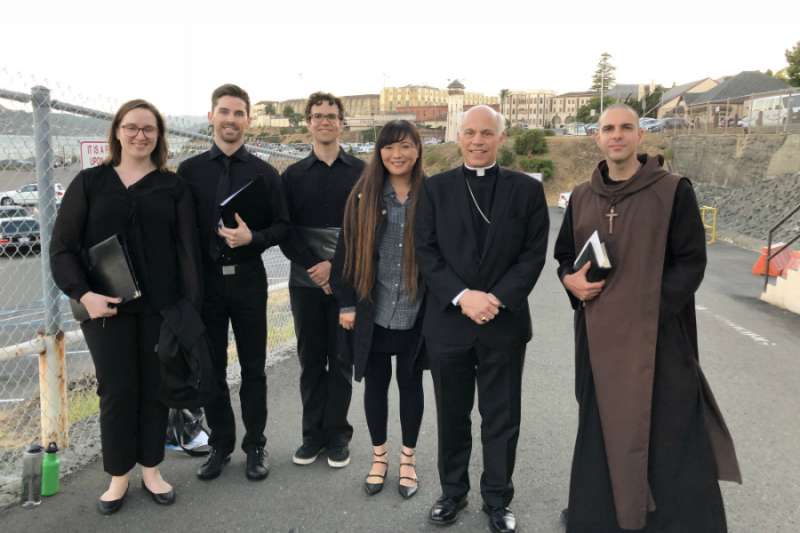When the Benedict XVI Institute in San Francisco formed a choir to teach Gregorian chant and sacred music to interested parishes, they landed the most unlikely of first gigs — a concert at San Quentin State Prison.
“God works in his mysterious ways,” Maggie Gallagher, executive director of the institute, told CNA.
The traveling and teaching sacred music choir (schola) from the Benedict XVI Institute put on a concert and sacred music workshop for the inmates in the San Francisco-area prison Aug. 5.
The concert was a hit, Gallagher said, and many of the men flocked around the singers at the end of the concert to talk more about sacred music. Twenty-five inmates signed up to join the prison’s own schola, which will perform at a Traditional Latin Mass celebrated about once a month at the prison.
The Benedict XVI Institute was founded by Archbishop Salvatore Cordileone of San Francisco in 2014, with the mission of providing practical resources to help parishes have more beautiful and reverent liturgies, and to promote a Catholic culture in the arts.
“The important thing about our primary mission is that its practical resources, so we’re not a think tank about the liturgy,” Gallagher noted.
While the institute has existed for four years, the traveling, teaching schola only began this March, with the goal of teaching parishes how to use Gregorian chant and sacred music for more beautiful Masses.
“The archbishop kept emphasizing that until we were getting into parishes we were not succeeding,” Gallagher said.
Archbishop Cordileone was also a driving force behind the schola’s gig at San Quentin, a place he goes “fairly regularly” to celebrate Mass with the inmates. While celebrating Mass at the prison over Mother’s Day, Cordileone was approached by the prison’s chaplain, Fr. George Williams, who said he was interested in having the teaching choir come to San Quentin.
On Aug. 5, music director Rebekah Wu and a number of singers performed for and trained the men in chant. The twenty-five men who now form the prison’s schola will officially perform for the first time on Aug. 25, when the Traditional Latin Mass will be celebrated at San Quentin for the first time in three generations.
“This is our brand-new teaching choir and you are our first gig!” Cordileone told the men on Aug. 5, a comment met with “thunderous applause,” Gallagher said.
“I love telling people our first teaching gig is the San Quentin Schola!” Cordileone added.
Gallagher said the concert and formation of the schola had an overwhelmingly positive response from the inmates, some of whom are practiced musicians in their own right.
“They have a number of talented musicians with good voices, and as the archbishop said, they like to sing and they worship well,” she said.
"One young man told me that he felt the Holy Spirit buzzing in his soul while he joined the choir in some chanting during the concert. I was especially delighted to see that so many men want to learn Gregorian chant and classical sacred choral music, and help bring the Latin Mass to San Quentin,” Wu said after the concert.
Gallagher said she heard another man tell the choir: “I really don’t want to be in (prison), but if I have to be in here, I want to be in here listening to music like that.”
After the concert, Cordileone told Gallagher that through the music, he saw the inmates “lifted up to God by sacred beauty and given new hope.”
“The Benedict XVI Institute teaching choir is clearly fulfilling an important need in ordinary parishes but also for those at the margins of society,” Cordileone added.
The large turnout and positive response to the concert showed Williams that “the men at San Quentin have a hunger for beauty and prayer. The concert by the Benedict XVI Institute was clearly enjoyed by those who attended. They also appreciated the support and presence of Archbishop Cordileone who has made it a point to visit the prison often.”
The schola has been positively received by a number of different parishes and groups throughout the diocese that have expressed interest in learning sacred music, Gallagher said.
There’s something about Gregorian chant and polyphony “which for many many people just blows them away, just blows them up towards heaven,” Gallagher added.
Gallagher said she has often found that even for the most trained musicians, chant and sacred music is a new and powerful spiritual experience.
She added that sacred music also has an effect that seems to transcend typical ideological boundaries when it comes to the liturgy, and that it especially resonates with younger to middle-aged audiences who are tired of the so-called “liturgy wars.”
“I think this has a reach that gets beyond the normal ideological categories and that a lot of people are hungry for,” Gallagher said.
“We like to say if you’re being brought closer to God by the Mass that you’re experiencing, bless you, we’re not trying to take that away from anyone that’s being well fed. But there is a hunger out there that is not being fed, and it’s exciting to watch the interest (in sacred music and chant) unfold.”

